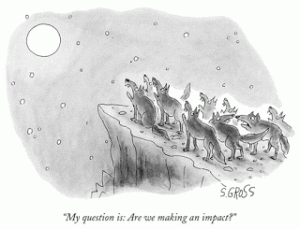How valuable is clinical supervision to you? In their massive, long-term international study of therapist development, researchers Orlinsky and Rønnestad (2005) found that “practitioners at all experience levels, theoretical orientations, professions, and nationalities report that supervised client experience is highly important for their current and career development” (p. 188).
Despite the value most of us place on the process, the latest review of the literature found no empirical evidence, “that psychotherapy supervision contributes to patient outcome” (Watkins, 2011). Said another way, supervision does not produce more effective clinicians. The result? In the US, at least, opportunities for clinical supervision are in the decline, replaced by growing documentation requirements and administrative oversight–a trend destined to continue if the dearth of evidence persists.
What can be done? Simply put, solicit formal feedback from clients regarding their experience of progress and the therapeutic relationship. Such information, in turn, can be used to guide supervision, providing both a focus for the consultation and data supporting its effectiveness. After all, multiple studies already document that the process improves outcomes while simultaneously decreasing drop out and deterioration rates (Miller, 2013 ).
Getting started is not difficult. First, access two, free, easy-to-use scales for monitoring client progress and the relationship. Second, join colleagues in the largest, online community of behavioral health professionals in the world. It’s free–no hidden costs or secret levels of premium content. On the ICCE, you can connect and consult with practitioners who are using feedback to improve the quality and outcome of treatment and supervision. If you are new to feedback-informed work (FIT)–a SAMHSA certified evidence-based practice–you can get a thorough introduction at: www.whatispcoms.com .
Finally, get the Feedback-Informed supervision manual and newly released, two-hour DVD. Both provide step-by step instructions and examples of integrating feedback into supervision. While you are at it, join us for our Feedback-Informed Supervision Intensive. Last time around, it sold out months advance. Registration is now open for our next training in March 2015.

